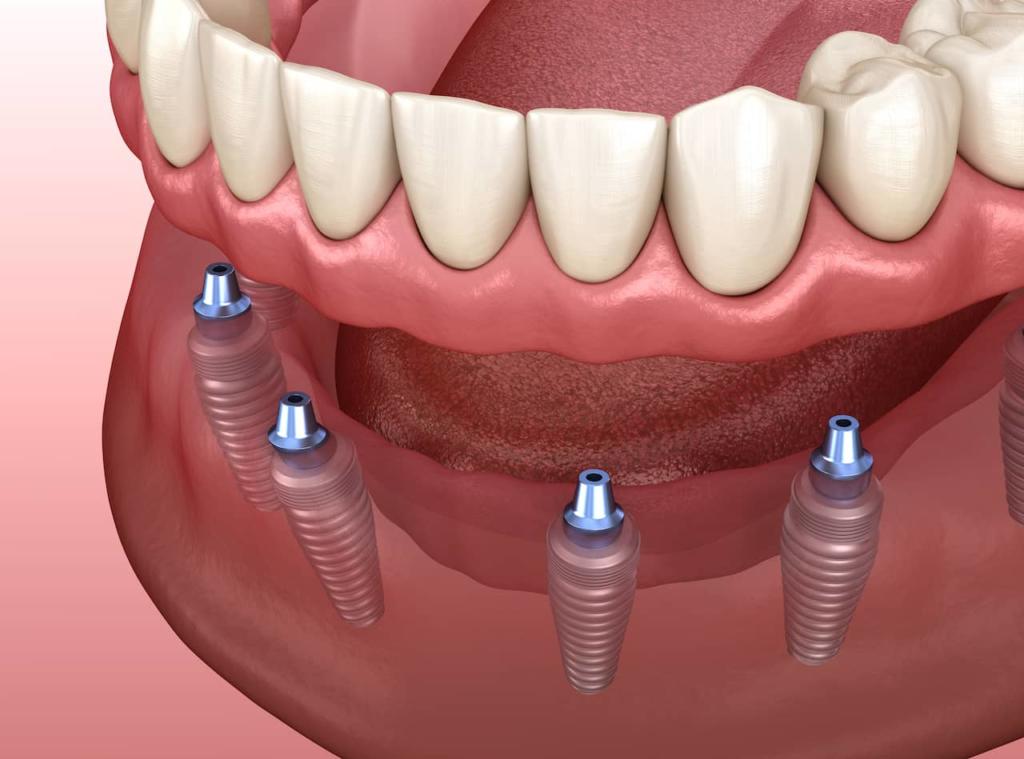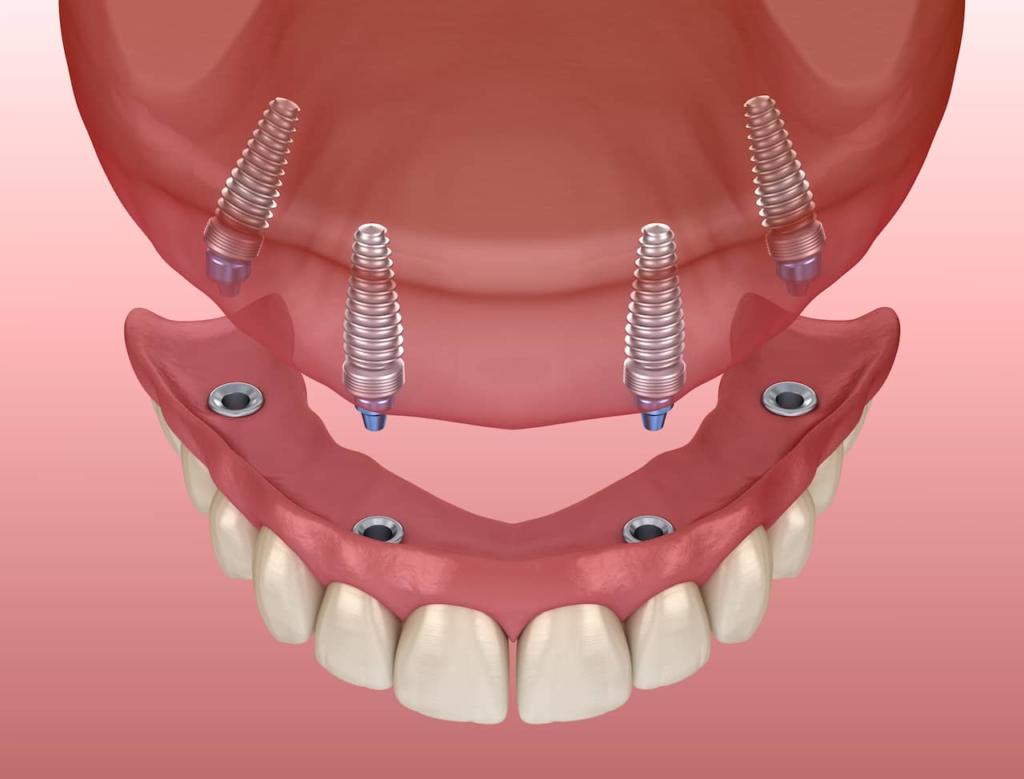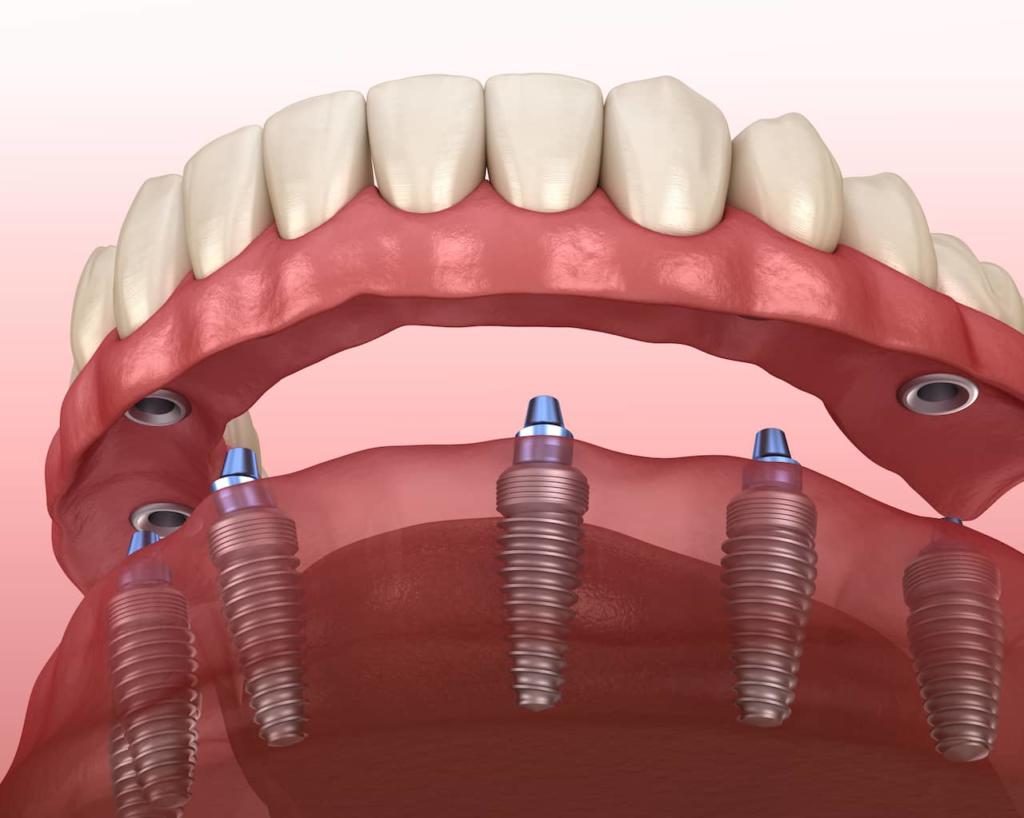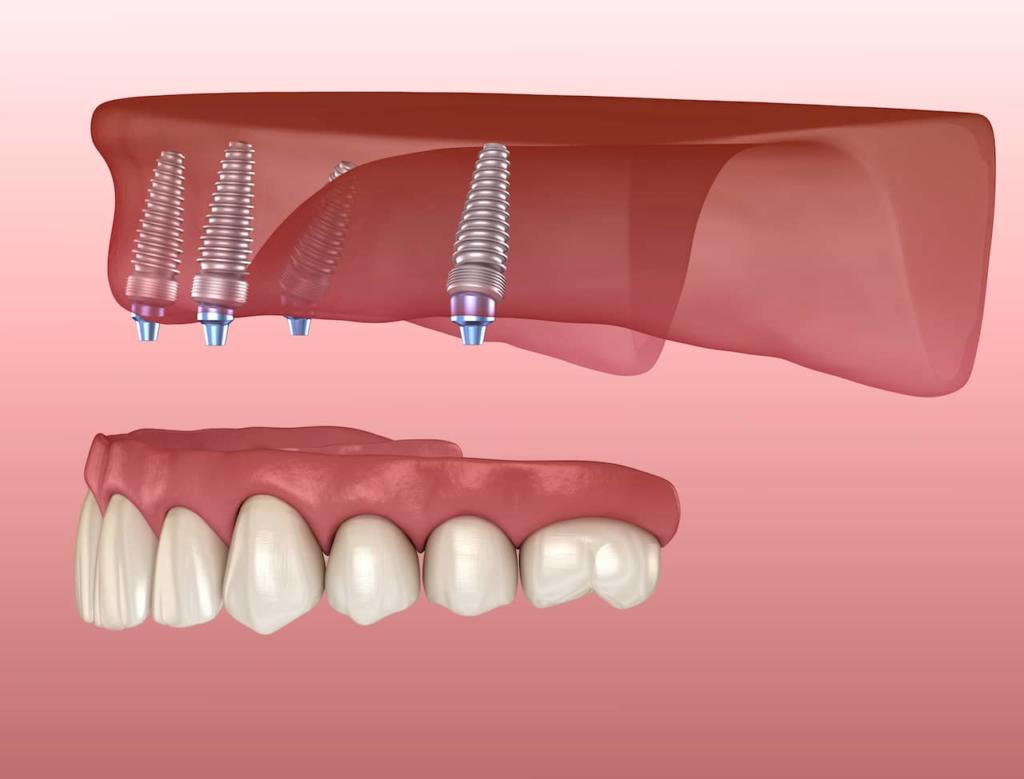
Should You Get All-On-4 Dental Implants?
By David Hudnall, DMD
Now, more than ever, denture wearers have options. They’re no longer forced to deal with wearing the same type of dentures that their grandparents wore. While some patients swear by their dentures, stating that getting dentures was the best decision they ever made, many others find wearing dentures a source of frustration.
Traditional dentures can slip while talking, laughing, or speaking, creating embarrassing social interactions. What is a denture wearer to do? Get all-on-4 dentures, that’s what!
What Are All-on-4 Dental Implants?
The term all-on-4 refers to a complete denture being supported by four (or more) dental implants that are evenly spaced throughout the patient’s arch. This implant configuration provides the greatest stability and allows the complete denture to snap into place, preventing it from moving and eliminating the need for messy denture adhesives.
All-on-4 dental implants may also be used to support a screw-retained hybrid denture that is not removable by the patient, providing the patient even more security and confidence. Most all-on-4 implant patients say that the procedure was life-changing and they wish they had done it sooner.
Who Are the Best All-on-4 Dental Candidates?
All-on-4 dental implants should be a consideration for every patient who is missing all of their teeth. They can also be beneficial when the patient is missing so many neighboring teeth that a partial denture alone would not be a stable tooth replacement option. The ability to have false teeth stabilized and secured without dental adhesives is a real game-changer.
The best candidates for the all-on-4 dental implant procedure possess certain factors: a clean bill of health, sufficient bone structure to support the implants, and the absence of on-going dental disease such as gum disease. Patients with chronic health issues such as autoimmune diseases, uncontrolled diabetes, uncontrolled circulatory system problems, or patients who have undergone certain types of cancer therapies are not appropriate candidates for dental implants or the all-on-4 procedure.
To find out if you are a candidate for all-on-4 dentures, contact European Denture Center.
What Is Involved in the All-on-4 Dental Procedure?
The steps involved may be different depending on your specific dental anatomy and treatment goals. Of course, there are follow-up appointments after each surgical procedure to assess healing and to reline or adjust your dentures for comfort.
Your treatment plan may require modification in progress, depending on your body’s ability to recover and heal from treatment. Here is a basic overview of what to expect with the all-on-4 procedure:
Treatment Planning
Your surgeon will consult with you and acquire numerous digital records in order to plan the all-on-4 dental implant procedure from start to finish.
Treatment Begins
Any preparatory bone grafting is performed. You continue to wear your existing denture while healing. If bone grafting is not necessary, move to the next step.
4 to 6 Months Later
Titanium implants are surgically placed into the jawbone at specific locations determined by computer-aided tomography. A temporary denture is placed over the implants to allow you to function while the implants fuse with your bone.
6 to 8 Months Later
The implants are uncovered and healing abutments are placed to allow the gum tissue to conform to the shape of the abutments. Your denture is further modified for use.
2 Weeks After Denture Modification
Impressions are taken and a permanent restoration is made to attach to the implants, replacing your natural teeth seamlessly. This process may require multiple appointments over a period of several weeks, tailored to the type of final restoration that you have chosen.
Frequently Asked Questions About All-on-4 Dental Implants
Potential candidates for all-on-4 dental implants naturally have questions. After all, there is a lot at stake, financially and otherwise. Here are answers to the most common inquiries:
How Much Do All-On-4 Dental Implants Cost?
The all-on-4 dental implant procedure can cost as little as $3,500 or as much as $20,000 or more. Since each patient’s anatomy is different, the cost of the entire procedure does vary considerably by patient. Some factors that influence all-on-4 dental implant cost include:
- Complexity of the case
- The need for more than 4 implants for improved denture stability
- Whether bone grafting surgery is required prior to implant placement
- Patient health/healing considerations
- The type of final restoration chosen
How Long Is All-on-4 Recovery?
Depending on your treatment plan, recovery may take place in multiple phases. If you require bone grafting in order to have enough bone for implant placement, you’ll need to heal from that and allow 4 to 6 months for new bone to form. Most bone graft surgeries are performed as an outpatient procedure under local anesthetic. After a successful surgery, any pain or discomfort will usually resolve within a few days.
Implant placement is much like the bone grafting procedure. You’ll be sore for a few days after treatment but be back to normal within a week, barring any complications. The best thing you can do is to follow the surgeon’s instructions for pre- and post-operative care. Arrange your schedule to allow time for rest, take medications as prescribed, use ice packs to control swelling, and keep the doctor informed in the event of unusual symptoms like excessive swelling or numbness that doesn’t resolve.
Are There Any Common All-on-4 Dental Implant Problems?
1. Lack of Patient Commitment
One of the biggest All-on-4 dental implant problems is related to patients who have unrealistic expectations. Although it may be possible to leave the dental office with teeth on the same day that implants are placed, your total treatment is far from complete.
The entire procedure requires a number of visits over the course of months. Necessary bone grafting can add 4 to 6 months to the procedure. Some temporary changes to your diet and habits will also be a necessary accommodation while you move from one step to the next. It is important to keep the end goal in mind.
2. Implant Failure
Like any surgical procedure, ultimate treatment success and implant integration depends on your body’s own healing response. Nothing works 100% of the time for 100% of patients. It is possible for the body to reject implants. Although implants can fail at any time, the most critical time for integration occurs in the weeks that immediately follow implant placement.
3. Commitment To Ongoing Care
Dental implants won’t last a lifetime if you don’t take care of them. Plan for routine follow-up care and maintenance visits with your dental professional every year. In addition to caring for the implants, the dentures or other restorations also require maintenance. Proper preventive maintenance will intercept many problems that can occur, saving you both time and money.
4. Smoking
Smoking is a big All-on-4 dental implant problem. It alters the body’s natural healing response. Smokers have a much higher incidence of implant failure and rejection over time as compared with non-smokers largely because smoking constricts the blood vessels that carry healing factors and nutrients to the gums and bone that support the implants.
5. Peri-Implantitis
Peri-implantitis is a type of bone loss that can lead to loose implants, much like periodontitis (gum disease) leads to loose natural teeth. Individuals who have lost their teeth because of gum disease are at higher risk for bone loss around the implants and may require more frequent dental cleanings to ensure that bone loss doesn’t become a problem.
How Do I Clean All-on-4 Dental Implants?
All-on-4 dental implants are cleaned using a brush especially-designed for cleaning around implants and under a non-removable dental appliance. Much like natural teeth, tartar can form around implants, making them prone to gum disease and failure. It is important to have your implants cleaned by your dental professional on a regular schedule.
How Long Do All-on-4 Implants Last?
With proper care, all-on-4 dental implants will last a lifetime. However, the restorations themselves will need to be replaced as they become worn. Much like traditional dentures, implant-supported dentures require replacement, on average, every 5 to 10 years. Hybrid dentures and bridgework can last much longer and may require replacement once or twice within your lifetime. Nothing artificial will last indefinitely.
All-on-4 Dental Implants Near Me
With four locations to serve you, European Denture Center is your source for information. We can determine if the all-on-4 dental implant procedure is right for you.
What are you waiting for? Call us or schedule an appointment online with one of our highly-trained dental professionals. You really don’t have to put up with dentures that move around in your mouth. There are better solutions!






